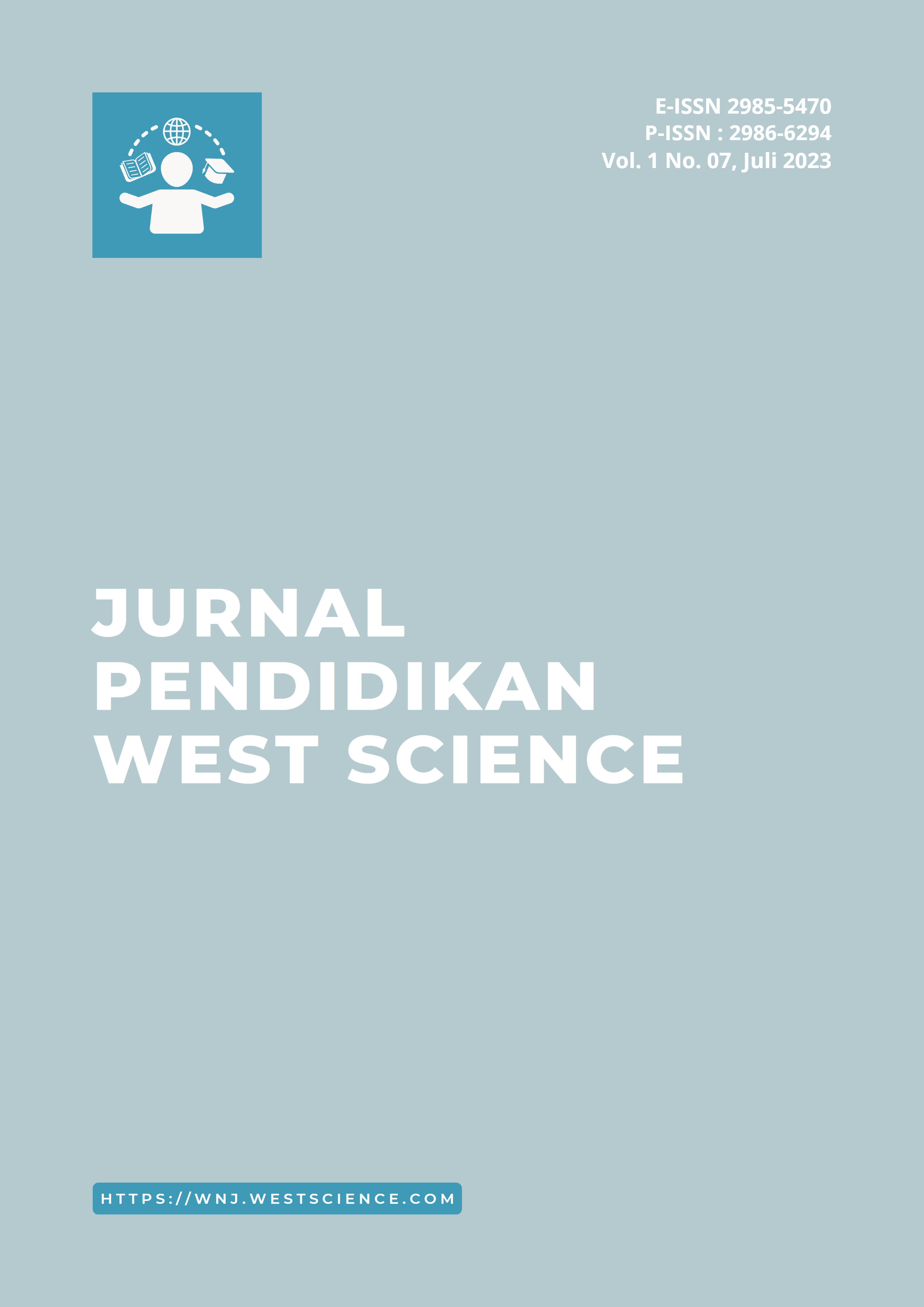Penggunaan Teknologi dalam Pendidikan: Analisis Literatur Mengenai Efektivitas dan Implementasi
DOI:
https://doi.org/10.58812/jpdws.v1i07.541Kata Kunci:
Technology in Education, Effectiveness, Implementation, Bibliometric Analysis, Teaching and Learning, Research TrendsAbstrak
Penelitian ini melakukan analisis bibliometrik yang komprehensif untuk mengeksplorasi penggunaan teknologi dalam pendidikan dan menilai efektivitas dan implementasinya. Penelitian ini berfokus pada analisis artikel ilmiah yang diterbitkan di bidang pendidikan, khususnya yang membahas integrasi teknologi dalam proses belajar mengajar. Dengan menggunakan teknik bibliometrik, penelitian ini mengidentifikasi tren utama, penulis yang berpengaruh, topik penelitian populer, dan dampak keseluruhan dari teknologi dalam lingkungan pendidikan. Temuan-temuan ini memberikan wawasan yang berharga mengenai kondisi penelitian saat ini di bidang ini dan menyoroti jalan yang potensial untuk penyelidikan di masa depan.
Referensi
Adcock, T. (2014). Technology integration in American Indian education: An overview. Journal of American Indian Education, 104–121.
Akram, W., & Kumar, R. (2017). A Study on Positive and Negative Effects of Social Media on Society. International Journal of Computer Sciences and Engineering, 5(10), 351–354. https://doi.org/10.26438/ijcse/v5i10.351354
Bharti, M. C. (2019). Role of digital library and information centers in modern education system and research development. Indian Journal of Library Science and Information Technology, 4(1), 1–4.
Ciric, Z., Sedlak, O., Horvat, A. M., & Stojic, D. (2021). Information technology impact on education for the development profession standards. EDULEARN21 Proceedings, 5723–5728.
Cojocaru, A. M., Bucea-Manea-Țoniș, R., Jianu, A., Dumangiu, M. A., Alexandrescu, L. U., & Cojocaru, M. (2022). The role of physical education and sports in modern society supported by IoT—a student perspective. Sustainability, 14(9), 5624.
Elmira, U., Abay, D., Shaimahanovna, D. A., Erzhenbaikyzy, M. A., Aigul, A., & Rabikha, K. (2022). The importance of game technology in primary education. World Journal on Educational Technology: Current Issues, 14(4), 996–1004.
Fathiya, N., & Asrizal, A. (2022). DEVELOPMENT OF STEM EDUCATION INTEGRATED SOUND AND LIGHT WAVES E-MODULE FOR CRITICAL AND CREATIVE THINKING SKILLS OF HIGH SCHOOL STUDENTS. PILLAR OF PHYSICS EDUCATION, 15(4), 276–286.
Geertshuis, S., & Liu, Q. (2022). The challenges we face: A professional identity analysis of learning technology implementation. Innovations in Education and Teaching International, 59(2), 205–215.
Gutiérrez-Colón, M., Frumuselu, A. D., & Curell, H. (2023). Mobile-assisted language learning to enhance L2 reading comprehension: A selection of implementation studies between 2012–2017. Interactive Learning Environments, 31(2), 854–862.
Hau, N. H., Cuong, T. V., & Tinh, T. T. (2020). Students and teachers ‘perspective of the importance of arts in steam education in Vietnam. Journal of Critical Reviews, 7(11), 666–671.
Hu, X., & Yelland, N. (2019). Changing learning ecologies in early childhood teacher education: From technology to stem learning. Beijing International Review of Education, 1(2–3), 488–506.
Hughes, B. S., Corrigan, M. W., Grove, D., Andersen, S. B., & Wong, J. T. (2022). Integrating arts with STEM and leading with STEAM to increase science learning with equity for emerging bilingual learners in the United States. International Journal of STEM Education, 9(1), 1–19.
Juškevičienė, A., Dagienė, V., & Dolgopolovas, V. (2021). Integrated activities in STEM environment: Methodology and implementation practice. Computer Applications in Engineering Education, 29(1), 209–228.
Limantara, N., Ford, L. G., & Prabowo, H. (2022). Factors Influencing the Implementation of Gamification for Learning in Information Systems Education. International Journal of Emerging Technologies in Learning (Online), 17(8), 32.
Naji, K. K., Ebead, U., Al-Ali, A. K., & Du, X. (2020). Comparing Models of Problem and Project-Based Learning (PBL) Courses and Student Engagement in Civil Engineering in Qatar. Eurasia Journal of Mathematics, Science and Technology Education, 16(8).
Opriș, I., & Cenușă, V.-E. (2017). Subject-spotting experimental method for gen Z. TEM Journal, 6(4), 683.
Rustaman, N., & Lufri, M. S. (2016). Pembelajaran Masa Depan melalui Stem Education. Seminar Nasional Biologi Edukasi, 1.
Schleicher, A. (2020). The Impact of COVID-19 on Education: Insights from" Education at a Glance 2020". OECD Publishing.
Stumbo, N. J., Martin, J. K., & Hedrick, B. N. (2009). Assistive technology: Impact on education, employment, and independence of individuals with physical disabilities. Journal of Vocational Rehabilitation, 30(2), 99–110.
Suwastika, I. W. K. (2018). Pengaruh E-Learning sebagai Salah Satu Media Pembelajaran Berbasis Teknologi Informasi Terhadap Motivasi Belajar Mahasiswa. Jurnal Sistem Dan Informatika (JSI), 13(1), 1–5.
Tondeur, J., Petko, D., Christensen, R., Drossel, K., Starkey, L., Knezek, G., & Schmidt-Crawford, D. A. (2021). Quality criteria for conceptual technology integration models in education: Bridging research and practice. Educational Technology Research and Development, 1–22.
Wang, B. (2022). The role of the Internet in modern education of China. Man and Education, 2 (67), 157–166.
Wekerle, C., Daumiller, M., & Kollar, I. (2022). Using digital technology to promote higher education learning: The importance of different learning activities and their relations to learning outcomes. Journal of Research on Technology in Education, 54(1), 1–17.
Wilson, M. L. (2022). Topics, author profiles, and collaboration networks in the Journal of Research on Technology in Education: A bibliometric analysis of 20 years of research. Journal of Research on Technology in Education, 1–23.
Xu, Q., & Zhong, M. (2023). The impact of income inequity on energy consumption: The moderating role of digitalization. Journal of Environmental Management, 325, 116464.
Yien, J.-M., Hung, C.-M., Hwang, G.-J., & Lin, Y.-C. (2011). A game-based learning approach to improving students’ learning achievements in a Nutrition course. Turkish Online Journal of Educational Technology-TOJET, 10(2), 1–10.
Unduhan
Diterbitkan
Cara Mengutip
Terbitan
Bagian
Lisensi
Hak Cipta (c) 2023 Arief Yanto Rukmana, Supriandi, Rio Wirawan

Artikel ini berlisensiCreative Commons Attribution-ShareAlike 4.0 International License.



















 Instagram
Instagram 